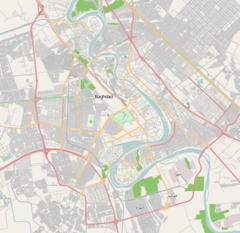Haydar-Khana Mosque
| Haydar-Khana Mosque | |
|---|---|
Arabic: جامع الحيدرخانة | |
 | |
| Religion | |
| Affiliation | Islam |
| Rite | Sunni Islam and formerly Shia Islam[citation needed] |
| Ecclesiastical or organisational status | Mosque and madrasa |
| Status | Active |
| Location | |
| Location | Baghdad, Iraq |
 Location in Baghdad | |
| Geographic coordinates | 33°19′30″N 44°25′19″E / 33.32500°N 44.42194°ECoordinates: 33°19′30″N 44°25′19″E / 33.32500°N 44.42194°E |
| Architecture | |
| Style | Ottoman architecture |
| Specifications | |
| Dome(s) | 3 |
| Minaret(s) | 1 |
The Haydar-Khana Mosque (Arabic: جامع الحيدرخانة) is a historic Persian-style mosque in Baghdad, Iraq. Situated in Al Rasheed Street,[1] the mosque was originally built by and attributed to Haydar Pasha Jalabi bin Muhammad Jalabi Shah Bandar, who is buried in the same place along with some members of his family. The mosque was later reconstructed and expanded during 1819-1827 by the Wazir of Baghdad Dawud Pasha, the last wali of the Mamluk dynasty in Iraq.[2] Dawud Pasha established the madrasa in the same place, known as Madrasa al-Dawudia. There is also an attached library.
Reconstruction and maintenance were carried out in 1827 during the reign of the Ottoman Sultan Mahmud Khan bin Abdul-Hamid, again in 1890 by the Ottoman emir Abdul-Hamid Al-Thani.[2] During this time, an attached water shop which faced the nearby Souq Haydar-Khana was demolished. During the 1920s, the mosque was utilized as an assembly place for revolutionaries who carried out numbers of revolutions throughout the decade.
Haydar-Khana Mosque is considered one of the finest examples of the Ottoman constructions in Baghdad. The mosque is square-shaped, and the three doors are made of marble. Inside the mosque, there are mushollas (prayer space) for summer and winter, and the winter musholla is topped by the blue dome with two smaller domes and a minaret surrounding it.[2]
Gallery[]

The only remaining interior decorations of the mosque dome after decay.
See also[]
References[]
- ^ Marozzi, Justin. Baghdad: City of Peace, City of Blood. Penguin UK, May 29, 2014.
- ^ Jump up to: a b c US Department of Defense. "016. Baghdad - Haydar-Khana Mosque". Cultural Property Training Resource. Colorado State University. Retrieved January 4, 2018.
| Wikimedia Commons has media related to Al-Hayder Khana Mosque. |
- 19th-century mosques
- Mosques in Baghdad
- Ottoman mosques in Iraq
- Shia mosques in Iraq
- Sunni mosques in Iraq
- Iraqi mosque stubs



